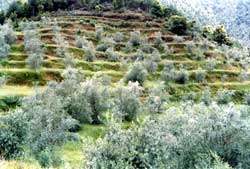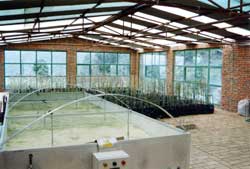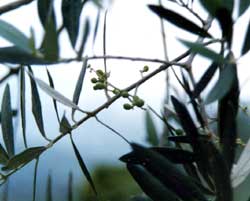 Once upon a time, middle-eastern civilisations had a magical fruit that the rest of the world wouldn't know about for many centuries. The Phoenicians, Greeks, Romans, Carthaginians, and Arabs spread it all along the Mediterranean coast and later the Spaniards brought this wonderful secret to the New World. Today, olives are grown all over the world. Including Nepal.
Once upon a time, middle-eastern civilisations had a magical fruit that the rest of the world wouldn't know about for many centuries. The Phoenicians, Greeks, Romans, Carthaginians, and Arabs spread it all along the Mediterranean coast and later the Spaniards brought this wonderful secret to the New World. Today, olives are grown all over the world. Including Nepal. 
Hartmut Bauder was manager of the Indian branch of a large pharmaceutical company for over two decades, until eight years ago, when he decided that he'd had enough, and came to live in Kathmandu with his Nepali wife, Pramila. Since they've moved here, they set up Himalayan Plantation in order to carry out some pretty strange projects-such as bringing alpacas from Chile to the Himalaya (See "Andean llams in the Himalaya", #15).
Next on their minds was olives. There have been reports of people coming across wild olives in part of Nepal like Manang, which makes sense-the climate is semi-arid, which is what the trees need, and the soil is just rich enough. After searching for months, Bauder came upon the forgotten, but fertile, valley of Chitlang in Makwanpur, on the old trade route to Kathmandu.
 To begin with, Bauder bought 10 hectares of land in two areas in Chitlang and named them Tuscany and Vinci, after the Italian region and town famous for their olive oil-drenched cuisine. That was eight years ago. Today the olive saplings Bauder brought from all over the world are handsome trees. In the two plantations, he has 2,400 trees with at least 15 different varieties of olives. The trees yielded some 65 kilos of fruit last year, and there may be significantly more this year. There are olive trees more than 2,000 years old that produce over 800 kilos of fruit a year. The trees in Chitlang may seem inconsequential in comparison, but that's all right with Bauder. "You don't plant olive trees for yourself but for the sons of your sons."
To begin with, Bauder bought 10 hectares of land in two areas in Chitlang and named them Tuscany and Vinci, after the Italian region and town famous for their olive oil-drenched cuisine. That was eight years ago. Today the olive saplings Bauder brought from all over the world are handsome trees. In the two plantations, he has 2,400 trees with at least 15 different varieties of olives. The trees yielded some 65 kilos of fruit last year, and there may be significantly more this year. There are olive trees more than 2,000 years old that produce over 800 kilos of fruit a year. The trees in Chitlang may seem inconsequential in comparison, but that's all right with Bauder. "You don't plant olive trees for yourself but for the sons of your sons." So, more than an increase in harvest, Bauder is looking forward to pressing the first oil from the fruits of his farm. He's already ordered a pressing machine, and can't wait for it to get here. "This will be the first virgin olive oil produced here," he says proudly, looking forward to the autumn harvest.
There's good reason for Bauder to be excited-olive oil is slowly catching on in Nepal, and not just because it is an un-smelly massage oil. Sure, we know that olive oil is "good for you". But just how good? It is a proven fact that people from the Mediterranean, who use the oil in quantities that would seem unhealthy, live longer, and healthier, than virtually any other group in the world. "The idea was to sell the concept to farmers and the general public at large so that people are aware of the advantages of using olive oil," says Bauder.
The single most important fact in this era of lifestyle diseases such as heart disease and diabetes is that olive oil lowers total cholesterol but raises high-density lipoproteins, which reduce the risk of coronary heart disease. In addition, food prepared in olive oil has a mild laxative effect and corrects chronic constipation. It stimulates the gall bladder and protects against gallstones. And it tastes great.
It isn't, unfortunately, that easy to grow olives or press oil from them. Olive trees are seriously harmed by too much water, and are very susceptible to insects and pests. Even after the shrub has grown into a tree, it needs to be pruned constantly to ensure a higher yield. When it comes to harvest, a similar amount of attention to detail is needed. Quality olive oil is obtained from sound, whole olives that are best just when just their green colour is darkening to black or purple. Olives are generally picked by hand but can also be harvested using poles and nets placed above the grounds to collect the fruit. Some people even use shaking machines to get the fruit off the tree. The important thing, regardless of how the olives are harvested, is to not let the fruit fall to the ground, because this affects the quality of the oil.
 To produce the best oil, olives needs be crushed right after being picked, because they start to ferment rather fast. They are crushed and spread on pressing mats stacked one on top of the other; entire stacks are then compressed using a hydraulic press. The more modern method is by centrifuging the paste in a horizontal shaft decanter. The oil that is obtained from either of these two methods is the purest form of olive oil and is called 'virgin'. The International Olive Oil Council states that virgin olive oil should have undergone no treatment other than washing, decantation, centrifuging and filtration. After that, depending on the acidity, odour and colour, virgin olive oil is further classified as extra virgin, virgin or ordinary.
To produce the best oil, olives needs be crushed right after being picked, because they start to ferment rather fast. They are crushed and spread on pressing mats stacked one on top of the other; entire stacks are then compressed using a hydraulic press. The more modern method is by centrifuging the paste in a horizontal shaft decanter. The oil that is obtained from either of these two methods is the purest form of olive oil and is called 'virgin'. The International Olive Oil Council states that virgin olive oil should have undergone no treatment other than washing, decantation, centrifuging and filtration. After that, depending on the acidity, odour and colour, virgin olive oil is further classified as extra virgin, virgin or ordinary. As increasingly stressed Nepalis start discovering the health benefits of olive oil, there's no doubt it won't just be used as massage oil anymore. Get ready to eat vegetables and meats, salads and pastas saut?ed in and drizzled with the oil of the gods-all-Nepali, of course.


